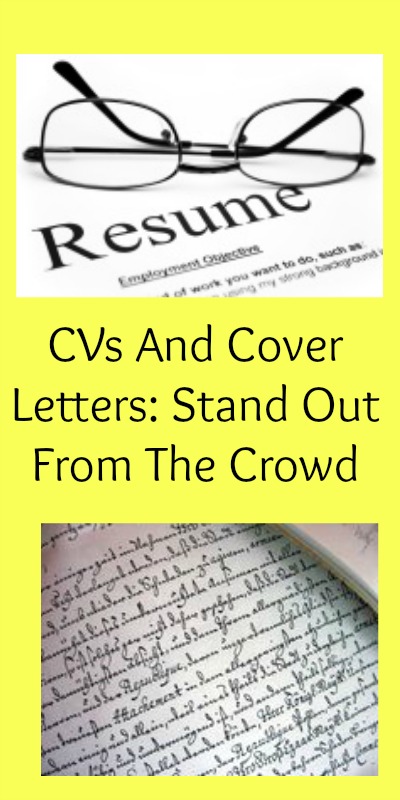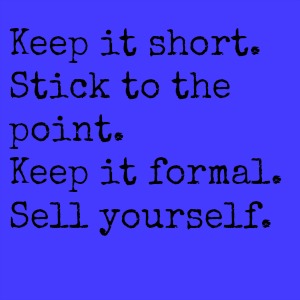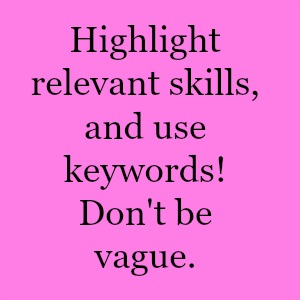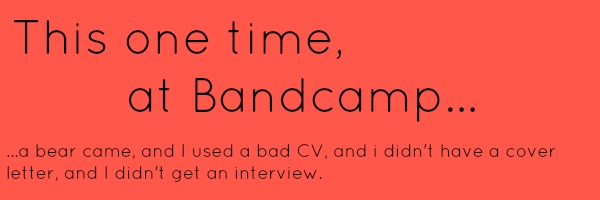Following on from yesterday’s post, How to find your dream job, I thought today I would talk about CVs and cover letters.
Once you’ve got a list of jobs you want to apply for, it’s time to get down on paper the facts that will make a recruiter want to meet you.
Bear in mind they will get hundreds of CVs and cover letters. It’s important to make sure yours stand out.

CVs and Cover Letters – Writing Your Cover Letter
Your cover letter is the recruiter’s first impression of you. It’s this letter that will make them decide whether or not to even consider your CV.
Do’s and Don’ts
- Don’t send a generic form letter. Recruiters are looking for someone who suits the role. A generic letter not only missed out on the chance to tell them why it’s you, it’s also gives the impression you are lazy – if you can’t be
 bothered to write a proper cover letter, recruiters are left wondering if you will be willing to put any effort into the job.
bothered to write a proper cover letter, recruiters are left wondering if you will be willing to put any effort into the job. - Do write the cover letter into the body of the email if you’re applying this way, rather than a separate attachment. A recruiter doesn’t want to have to go searching for it.
- Don’t make the mistake I made when I was young (and see so many people make today) and have your cover letter read “Please find attached my CV for consideration for the role of XYZ” and nothing else. Yes, I’ve done that.
- Do look at the job description/person specification and pick up a few points (maximum of five) and make a bullet point list briefly explaining how you relate to those points.
- Don’t waffle on. Keep it two or three snappy paragraphs. Your CV is there to do the talking, your cover letter is just to draw in the recruiter to make them want to look at your CV.
- Do use the recruiters name when beginning the letter and sign off correctly “Yours Sincerely”. Not cheers or regards.
CVs and Cover Letters – Writing Your CV
Your CV, or resume, is your chance to sell yourself to a potential employer, your chance to tell them exactly why you are right for the position.
You want it to stand out from the others, but for the right reasons – writing it on pink paper isn’t the right reason. As a rule of thumb, unless you are applying for a highly creative job, I would advise you to use a standard white, good quality paper and a readable, unfussy font.
For years the advice has been to use Times New Roman. Now it seems that people are turning away from that and using Georgia because it is the most widely available font that is readable on just about any electronic device.
Personally, if I was recruiting I wouldn’t be too worried about font, as long it is readable and not fussy.
Ideally, your CV should be one side of A4 paper typed in a font no smaller than 9. Two sides at the absolute maximum.
What You Should Include
- Your full name: I know this sounds like a no brainer, but you’d be surprised.

This is Georgia font!
- Contact details: An email address and a telephone number is fine. You don’t need to include your full postal address unless it’s specifically requested or the ad states you will be contacted by post. It’s advisable to include your current town/city if you want to be local.
- A one paragraph section about you that’s not work related. Your hobbies etc. Play this section clever. Although it should be personal, there’s nothing wrong with being selective. A prospective employer doesn’t class “socialising” as a hobby. Try to use a hobby that in some way relates to the position. For example, if you love hiking and you are applying for a job that involves a lot of out doors work, or a certain level of fitness, include it. Don’t lie. There’s a tiny chance that the person who will interview you is into the same things and they would expect you to be able to talk about it.
- A section detailing your qualifications. Even if the role doesn’t specify any particular qualification, there is nothing wrong with showing the recruiter you are well educated. For GCSEs, don’t list them all individually – something along the lines of “10 GCSEs grade A-C including English, Mathematics and Science” is enough.
- Your employment history, starting with your most recent role and then in reverse chronological order. This section is where you can play up skills you have experience in which the role requires. Include your job title and your main responsibilities and achievements. For example: Sales Manager. Responsible for managing a team of five individuals which included strict targets. Consistently beat sales targets by 5%. Don’t exaggerate – recruiters will check.
What You Shouldn’t Include
- Your home address, except in the situations detailed above
- Your date of birth: Your date of birth is irrelevant and takes up space that could be used for something else. Don’t give anyone a chance to discriminate against you based on your age. I know technically that’s illegal – it doesn’t mean it doesn’t happen, it just means that’s not the reason you are given. The exceptions to this are if you have just left school and don’t have any previous job history. Letting a recruiter know you are of school leaving age explains this. Also, if the position is age restricted, for example, a position in a licensed betting shop.
- Your gender, race or sexuality: Don’t leave this out because you are ashamed of who you are, leave it out because it has no bearing on the role.
- Irrelevant skills: It’s unlikely the recruiter cares you won “Friendliest classmate” when you were 10.

- Reference information: A recruiter will ask for references if and when you are offered the position.
- Reasons for leaving past employment. There will be time to explain this at the interview stage, where it is easier to spin any negative leavings in a positive light than it is on paper.
General tips
- Make the recruiter excited to meet you. Sell yourself. A CV isn’t the place for modesty, it’s the place to tell someone why you are better for the role than the other hundreds of people who have applied.
- Ensure you fully explain any gaps in employment. If you took a career break to travel the world, or raise your children, explain that. A gap without a reason looks suspicious.
- Separate your sections and sub-sections with headings so it isn’t just a huge chunk of text. Remember recruiters skim read. Mostly in a repeated E shape, so grab their attention at the top, then use headings to cut in and grab it again. And finish on a something you want them to remember.
- Use keywords from the job description/person specification within your experience section. Some companies use key word searches before they even begin to read anything you’ve written.
- Don’t try to be humorous. There’s a time and a place for humour. CVs and cover letters aren’t it.
- If you use a template for your CV (or cover letter) it will be noticed. Remember recruiters see 100s of CVs. If you really feel you need one, at least change it around a bit – amend the font, change the headings, anything to make it look more “you”.
- Tailor your CVs and cover letters for each role you apply for, making sure you highlight the most relevant things for each role and use the correct keywords. No one wants to read a form letter.
- Always ensure you regularly update your CV, and don’t forget to replace the old version on any online services you have it stored on, and send it to any recruitment agencies that have a copy.

I hope my tips on CVs and cover letters have been helpful. If you have any tips to add, why not share them in the comments
Check back tomorrow for my tips on the all important interview stage.
You can find me here: Twitter Facebook Bloglovin Pinterest and Instagram Please do stop by and say hi!


great tips! I enjoyed reading these and found it really interesting. I have not had a cv in a long time but i guess i wont need one for a while either! Still good to brush up on skills for helping others!
Thank you I’m glad you enjoyed it. My CV really needs an overhaul, that’s where I got the idea for the careers posts.
I’m glad you enjoyed it. My CV really needs an overhaul, that’s where I got the idea for the careers posts.
Great tips. This has really helped me today as I’ve spent this morning sorting out my CV and writing a covering letter for a job application. Thanks for posting!
Thank you I’m glad it helped you, good luck with your application!
I’m glad it helped you, good luck with your application!
I am really enjoying these posts! Very handy and informative! Thanks for sharing with #abitofeverything
Thank you, I’m glad you’re enjoying them Thanks for hosting!
Thanks for hosting!
Great tips! Thanks for linking up to #TheList x
Thank you and thanks for hosting x
x